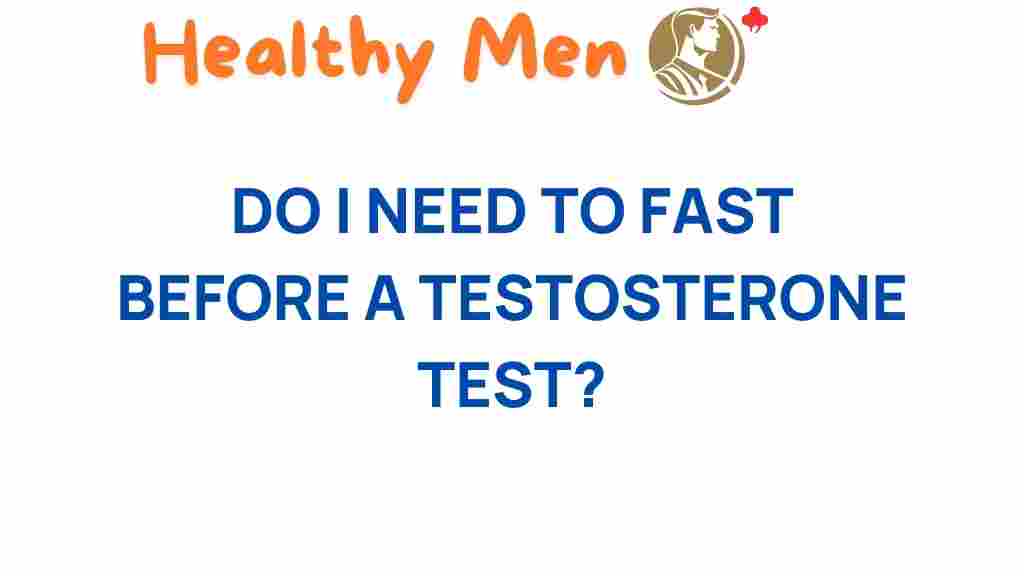Unveiling the Truth: Is Fasting Necessary Before a Testosterone Test?
When it comes to assessing hormone levels, particularly testosterone, many people wonder about the importance of fasting. A testosterone test is a common procedure used to evaluate hormone levels, diagnose potential health issues, and monitor treatment effectiveness. This article delves into whether fasting is necessary before a testosterone test, providing you with crucial insights for better health assessment and patient preparation.
Understanding Testosterone Tests
A testosterone test measures the level of testosterone in the blood. This hormone is essential for various bodily functions, including:
- Regulating libido
- Maintaining bone density
- Supporting muscle strength
- Influencing mood and energy levels
Low testosterone levels can lead to several health issues, such as fatigue, depression, and reduced muscle mass. Thus, a testosterone test is an important part of a comprehensive health assessment, especially for men experiencing symptoms related to low testosterone.
Fasting and Its Impact on Hormone Levels
Fasting refers to abstaining from all or some foods and drinks for a specified period. The idea behind fasting before certain blood tests is that it can provide more accurate results by eliminating variables that may affect hormone levels. However, the necessity of fasting before a testosterone test is still a subject of debate.
Do You Need to Fast Before a Testosterone Test?
According to recent studies and medical guidelines, fasting is not typically required before a testosterone test. Here’s a more detailed look at the reasoning:
- Stable Hormone Levels: Testosterone levels in the blood remain relatively stable throughout the day, although they can fluctuate slightly. Fasting does not significantly alter testosterone levels.
- Timing of the Test: Testosterone levels are usually highest in the morning and decrease throughout the day. Therefore, the timing of the test is more critical than fasting.
- Food Intake Effects: While certain foods can impact blood sugar and lipid levels, they do not have a significant effect on testosterone measurements.
It is always best to follow specific medical advice from your healthcare provider regarding patient preparation for a testosterone test.
Step-by-Step Process for Preparing for a Testosterone Test
Even though fasting is generally unnecessary, there are still important steps to take when preparing for a testosterone test:
- Consult Your Doctor: Before scheduling your testosterone test, discuss your symptoms and medical history with your healthcare provider.
- Follow Medical Advice: Adhere to any specific instructions your doctor gives regarding medications or supplements that may affect test results.
- Schedule the Test Early: Aim to have your blood drawn in the morning to capture your testosterone levels at their peak.
- Avoid Alcohol and Drugs: Refrain from consuming alcohol and recreational drugs 48 hours prior to the test, as they can influence hormone levels.
- Maintain a Healthy Diet: Eating a balanced diet leading up to the test will help ensure your overall health.
Troubleshooting Common Concerns
Even with the best preparation, you might still have questions or concerns about your testosterone test. Here are some common troubleshooting tips:
What If I Ate Before the Test?
If you accidentally ate before your testosterone test, don’t panic. As mentioned earlier, fasting is not strictly necessary, and your results may still be valid. However, it’s always a good idea to inform your healthcare provider about your situation.
What If I’m Taking Medications?
Some medications can affect testosterone levels. Always inform your doctor about any medications or supplements you are taking, as they may advise you to pause certain medications before the test.
What If My Results Are Abnormal?
Abnormal testosterone levels can arise from various health issues, including hormonal imbalances, testicular disorders, or chronic illnesses. If your results are outside the normal range, your doctor may recommend further testing or treatment options.
Conclusion: Making Informed Decisions
In summary, fasting before a testosterone test is generally unnecessary. The focus should be on patient preparation and following your healthcare provider’s medical advice. Understanding the implications of your testosterone levels is vital for your overall health and wellness. If you’re experiencing symptoms related to low testosterone, consider discussing your concerns with your doctor and getting tested.
For more information on hormone testing and health assessments, check out this resource. Remember, being informed about your health is the first step towards wellness.
Always prioritize your health by staying updated on the latest medical guidelines and research. If you’re unsure about the preparation for any medical test, consult with a healthcare professional for personalized advice.
This article is in the category Conditions and created by healthymen Team
